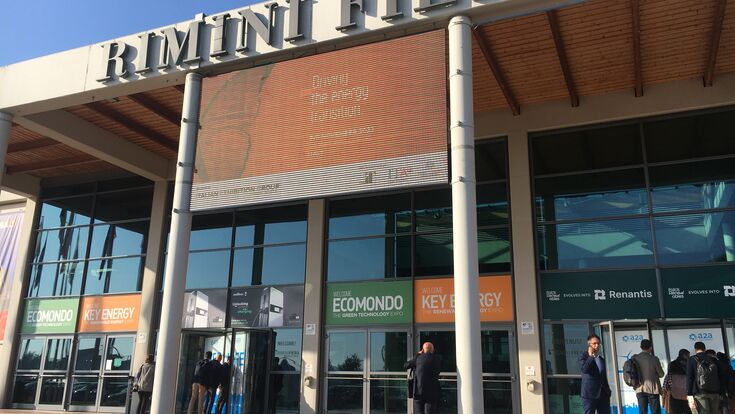Ecomondo 2022 : Innovations and new opportunities for the waste management industry

On November 8 Ecomondo opened its 25th edition with record numbers. And a weighty endorsement. That of the newly appointed Minister for the Environment and Energy Security, Gilberto Pichetto Fratin, who in a message sent to the organisation defined the event as 'the most important opportunity for discussion, proposal, and showcase of everything that revolves around the future in Italy, because our future can only be green, with a model of sustainable and circular development'.
The "flagship" appointment for ecological transition, which opened its doors at the Rimini Exhibition Centre together with Key Energy, dedicated to renewable energies, brings together at the Italian Exhibition Group pavilions, until 11 November, 1400 exhibitor brands, occupying all 130,000 square metres of the exhibition centre. A total of 160 events are scheduled (94 at Ecomondo and 66 at Key Energy), including 32 with the presence of European Commission representatives. More than 30 delegations and over 600 top buyers from 90 countries are expected.
Fabio Fava, president of Ecomondo's Scientific Committee, illustrated the topics at the centre of this edition: "The contribution of Ecomondo and Key Energy is to create the conditions for the green economy ecosystem to be able to grow in order to achieve the essential objectives of the Green Deal".
Innovations in the recycling sector
One of the session concentrated on innovation and inventions in the recycling sector. The presentations showed the importance of digitization and Artificial Intelligence for the future of the industry.
To improve operation traceability and process efficiency in their waste management business, Eni Rewind, Eni’s environmental company, created an integrated web platform aptly named Waste Management Center.
Fires at recycling facilities are more frequent than anybody could wish for. Early detection is important to avoid the spread of fires or even fatal fires. Conventional systems usually consist of a smoke detector that is installed in the upper part of the building. A new AI driven camera system developed by Bosch promise to detect fires much faster. Information can be interfaced to a panel and can also be received by a mobile app.
Apps are becoming more and more important in the waste management business. Specially to improve consumer engagement. Junker is an app that recognizes packaging and gives information on how to recycle it in the municipality you are in. The aim is to boost recycling rates, create cleaner waste streams, cause less costs for municipalities and for citizens to not risk fines. Up until now the app covers only Italian municipalities but contains already 1.8 million products.
Achieving climate neutrality by 2050 requires the rapid implementation of new, climate positive solutions. Many see big potential in new technologies for carbon capture and utilisation (CCU). The EU funded PYROCO2 project plans to demonstrate the scalability and economic viability of CCU to make climate-positive acetone out of industrial CO2 and renewable electricity derived hydrogen. The acetone produced by the PYROCO2 process will be demonstrated as an ideal platform for the catalytic synthesis of a range of chemicals, synthetic fuels, and recyclable polymer materials from CO2, generating a portfolio of viable business cases and pre-developed processes for replication and commercialization.
Developing new markets
Waste management seems like a very secure industry since there will always be waste. But of course world crisis do affect the sector. Climate change does affect the sector. But apart from the new risk factors there are also new possibilities for the waste management industry, as was discussed during the session on Mexico as a new market for green technologies. The market is especially attractive since so far very little of the waste is recycled but there is a keen interest in sustainable solutions. The potential value of the Mexican market is estimated at 1.2 billion Euro.
After the successful first edition of Ecomondo Mexico last July, the next event will take place in April 2023 with the aim of bringing together technologies and solutions from sectors that promote the ecological transition and the circular economy.

Another big market is textile recycling. Now that consumers are demanding more sustainability in the fashion industry and textiles have been identified as a key value chain in the EU action plan, to promote sustainability and circularity, as well as traceability and transparency, through a combination of eco-design requirements, producer responsibility schemes and labelling systems, even main actors of the fashion and luxury system like LVMH and Fendi promote sustainable development within their companies. During the session the new European inputs and requirements were discussed and the participants agreed they will boost innovation in the sector.

